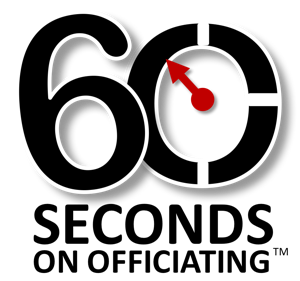
My Elbow Can’t Do That
Here’s a definitive list and update to several key articles regarding everything a scholastic player cannot do — legally — with their elbows!
Lock Up with a Teammate
It’s not legal for player to “lock elbows” or grasp a teammates arms to restrict the movement of an opponent. This type of screening action should immediately be ruled if contact occurred and the opponent was put at a disadvantage.
Swinging the Elbows Excessively
While this looks like a power-basketball move it’s quite dangerous when performed by a rebounder with the ball — or without for that matter. For a quick refresher on the ramifications of elbow swinging, check out this Ref60 article from a couple seasons ago. It’s a great review on how to handle these situations.
Elbow Contact Above the Shoulders
It’s been 5+ years since both the NFHS and NCAA started to clean this up a bit. Do you know when contact is personal, intentional or flagrant? Check out this comprehensive Ref60 article that details how to handle these “above the shoulder” contact fouls.
Hard and Unyielding
When it comes to guards, casts and braces it’s OK to be of a material that is rigid – like plastic, leather, plaster or metal – provided its covered properly with soft padding. However, these items are NOT permitted from the elbow and below. If you’re unsure on what can and cannot be worn, check out this Ref60 article and download the NFHS Uniform Matrix to be printed and carried in your officiating bag.
Elbow Position When Rebounding
To obtain or maintain a legal guarding position players are not legally permitted to extend their shoulders, hips, knees or extend their arms (including the elbows) in a position other than vertical that would hinder the freedom of movement for an opponent. Look for players who “wing out” their arms and use the elbows as “extenders” to create a wider than normal vertical rebounding space.

Great stuff, it’s too bad more younger referees don’t get this information.
Why foesn’t TheRule Book Rule for excessive swinging of the elbows state anything more than a violation? Most rules and Case Book Studies State what if’s. Why not elaborate on swinging elbows that are below shoulders, above shoulders, etc.? If an upcoming Official just reads the Tule Book, it only states excessive swinging of elbows is a Violation.
Add me to the list.
Great article!!
Great post!!